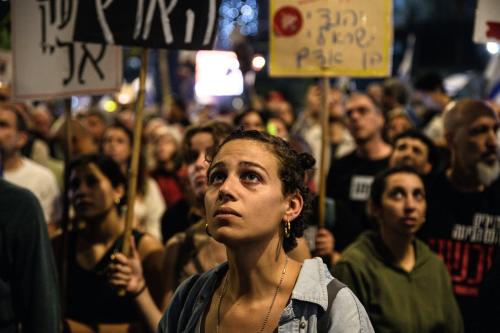

10:00 am EST - 11:30 am EST
Past Event
10:00 am - 11:30 am EST
1775 Massachusetts Ave., NW
Washington, DC
A year after the revolutions in Tunisia and Egypt ushered in the Arab awakening, the United States still faces the difficult task of forging a new strategy for a new Middle East. While regimes in Tunisia, Egypt and Libya eventually fell, the Syrian regime of Bashar al-Assad has clung to power with grim resolution. The regime has slaughtered its people and ignored pressure from domestic, regional and international actors. Meanwhile, Iran has viewed the Arab Spring as a mixture of opportunity and threat, all the while resisting fierce international demands to end its nuclear enrichment program. In recent weeks, the potential for escalation with one or both of these countries has captured the headlines while the relationship between them has largely been left to the back pages.
On February 2, the Saban Center for Middle East Policy at Brookings hosted a discussion to assess the ongoing crises with Syria and Iran, the potential for escalation, and America’s role in the situation. Panelists included Saban Center Senior Fellows Suzanne Maloney and Michael Doran, as well as Andrew Tabler, the next generation fellow at the Washington Institute for Near East Policy. Brookings Senior Fellow Kenneth Pollack, director of the Saban Center, provided introductory remarks and moderated the discussion.
After the program, panelists took audience questions.


Marvin Kalb
May 6, 2024

Madiha Afzal, Marsin Alshamary, Aslı Aydıntaşbaş, Pavel K. Baev, Sarah A. Binder, E.J. Dionne, Jr., Vanda Felbab-Brown, William A. Galston, Sharan Grewal, Ryan Hass, Tanvi Madan, Suzanne Maloney, Gian Maria Milesi-Ferretti, Itamar Rabinovich, Natan Sachs, Jaganath Sankaran, David Wessel, Andrew Yeo
April 15, 2024

Suzanne Maloney
April 8, 2024